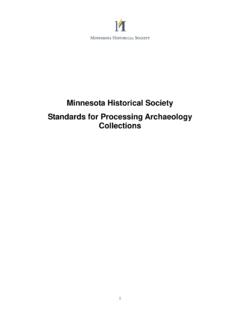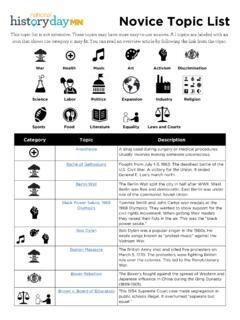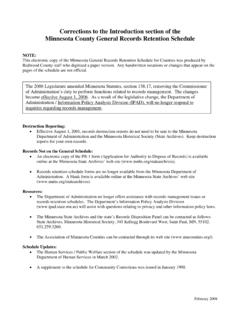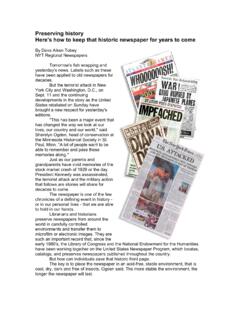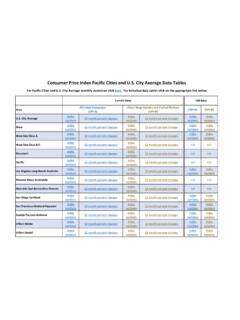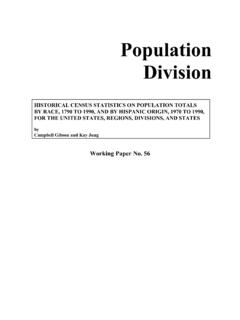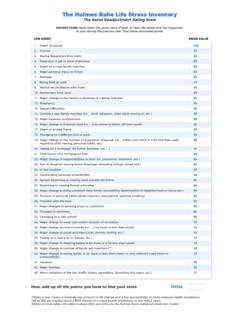Transcription of GUIDELINES FOR HISTORICAL RESEARCH AND WRITING
1 1 GUIDELINES FOR HISTORICAL RESEARCH AND WRITINGHOW TO APPROACH RESEARCH AND Steps to a good HISTORICAL RESEARCH A Short Guide to WRITING About History Richard Marius outlines fourteen steps that every studentshould follow in WRITING a HISTORICAL RESEARCH Identify your audience. All WRITING assignments are intended to be read, and the intendedaudience should always determine what is written. History is no different. An entry on Napoleon inWorld Book Encyclopedia is written for a general audience, while an article on Napoleon's WaterlooCampaign in the Journal of Military History is written for a scholarly audience. Unless otherwiseinstructed by your professor, you should always approach RESEARCH papers in history courses asthough you were WRITING an article for readers who have an interest in a particular subject but whomay not be specialists in the field. Define important terms and give enough information to provide acontext for your paper, but do not get bogged down in general Have a sharply focused and limited topic.
2 You must limit your topic in order to study thesources carefully, to think about them thoroughly, and to write about them meaningfully. If you tryto do too much, you will not do Present an argument. A common misconception about HISTORICAL RESEARCH papers is that theyshould simply compile the facts. Nothing is further from the truth. The purpose of WRITING ahistorical RESEARCH paper is to interpret the past. Do not simply provide what one would find inan encyclopedia entry, whose purpose is, in the words of Sergeant Joe Friday, "to state the facts, andnothing but the facts." Find a problem and try to solve it. Ask a question and seek to answer it. There must be a thesis or theses to Base your paper on primary sources and a thorough reading of secondary sources. Whenever possible trace your RESEARCH back to the primary sources. Primary sources are the textsnearest to any subject of investigation; secondary sources are always written about primary sources.
3 The most common primary sources are written documents. But primary sources can also includephotographs, paintings, sculpture, architecture, oral interviews, statistical tables, and even geography. A thorough reading of secondary sources will provide you a sense of interpretation. Never relyupon one secondary source! Always incorporate the views of as many secondary sources aspossible!5. Build your paper step by step on evidence. You must give readers reasons to believe yourstory. Nobody is interested in your opinion if it is not clear that you know something. Do not makegeneralizations, unless they can be immediately supported by quoting, summarizing, orotherwise alluding to a source. WRITING a history paper is similar to presenting a case in a court oflaw. The reader is your judge and jury and you must present evidence to support your case. Evidence is not always clear; it must be analyzed, evaluated, and pieced together before it can Provide a good title for your paper.
4 A good title not only captures the interest of the reader butalso helps the writer stay focused on the main Get to the point quickly and stick to it. A good paper sets the scene quickly, reveals a problemto be solved, and sets out in the direction of a solution. The best writers have somethingimportant to say and start saying it quickly. Within two paragraphs of the beginning, the readershould understand why you have written your paper; otherwise, the reader will lose interest beforeyou get to the point. Stick to the point. Be sure everything in your paper serves your mainpurpose, and be sure your readers understand how everything included in the paper relates tothe main Tell a good story. Capture the readers' imagination by WRITING descriptively, while at the sametime WRITING analytically. Good HISTORICAL WRITING should take the reader along a journey throughtime that explores important issues and arrives at a climax, where everything comes Document your sources.
5 You will not be taken seriously for your own work unless youdemonstrate that you are familiar with primary sources and the work of others who have studied thesame material. To avoid the cardinal sin of plagiarism, you must document the sources used forfacts, ideas, and interpretations presented in your paper, unless they are common Write dispassionately. Do not interject your emotions into your prose. Be careful in passingjudgments. People in the past must be judged by the standards of their own time, not ours. Allowpeople's actions or words to speak for themselves. Readers do not need coercive comments and oftenresent them. If you have presented the details, trust your readers to have the right Reach independent conclusions. A good paper demonstrates both thorough RESEARCH andindependent analysis. Never simply tie a series of block quotes together and try to pass it off asa RESEARCH paper!
6 Present your own conclusions and interpretations based upon thorough Consider counter-evidence. There is always more than one side to every issue. You must takecounter-evidence into account. Never RESEARCH and write toward a preconceived idea. Let yourresearch be your guide. Always consider opposing information and interpretations in WRITING apaper; the reader will have more confidence in your conclusions if it is clear that you have weighedevery side of an issue carefully before reaching a Use standard English and observe the common conventions of WRITING . A paper may bebased upon thorough RESEARCH of both primary and secondary sources, but it will be worthless if it ispoorly written. The reader not only will be unable to understand the point the writer is trying toconvey, but will not take him\her seriously. If the reader has to read a sentence more than once, oddsare that something is wrong with the sentence.
7 14. Let your first and last paragraphs mirror each other. Although your beginning and endingshould not be mechanical recitations of "what I am going to write about" and "what I have writtenabout," they should reflect some of the same words and ideas. The introduction sets out the problem,the body points toward the solution, and the conclusion ties it all Historian's Questioning Your Sources: Our knowledge of the past is limited to the sources available aboutthe past. Just as the journalist asks questions to arrive at an understanding of the present, a historianmust ask questions of his\her sources to arrive at an understanding of the Who questions not only seek to provide biographical information, but also make us think ofcharacter. Who was Martin Luther? What kind of person was he? What did people who knew himsay about him? Who questions raise the issue of responsibility.
8 Who was most responsible for theFirst World War? Who questions make us think of those affected by various events. Who was mostlikely to die during the Black Death? Who was most likely to vote for Jackson in the Election of1828?3. What questions seek to understand what really happened. Like a detective, you might have topiece together evidence from a variety of sources to find the answer. In some cases it might bedifficult to determine because the evidence is either lacking or is contradictory. What reallyhappened during the duel between Hamilton and Burr? What questions also seek to understand whatsomething means. Certain words, such as liberal have a far different meaning in a nineteenth-century context than a twentieth-century When questions help place HISTORICAL events in their proper time frame. When questions alsoprovide important answers to problems in history when asked in relation to something else.
9 What didNixon know and When did he know it? When did LBJ make the decision to commit forces inVietnam? Before or after Tokin? During the Election of 1964?5. Where questions seek to place events in a geographical context. Where were the best Unionforces placed at Gettysburg? Answering a where question can also help answer other questions. Where did crops fail in France during the summer of 1789? Where were the most violent upheavelsin the countryside? Answer: the same areas, which tells us that economic distress had more of animpact on the masses that the ideas of the Why questions are what make history fascinating and worth WRITING about. Knowing whathappened is not enough. The historian seeks to discover why it happened and why it had theinfluence that it Always distinguish between the precipitating cause and the background causes of a greatevent. The assassination of the Archduke Franz Ferdinand precipitated the First World War; itdid not by itself cause the First World War.
10 Precipitating causes make good RESEARCH topicsbecause they have a natural focus and because "What happened?", "Why it happened?", and"Why did it had the impact that it did?" merge Remember that HISTORICAL causation is complex. Seldom does one thing cause another. Always examine events in their proper context by weighing the relative importance of variouscauses. Avoid taking a backward view of history; HISTORICAL events flow forward. Just becauseone event preceeded another does not mean that they were connected. Do not forget the masseswhen examining the actions of great leaders? Did the leader shape public opinion, or what heshaped by it?c. Be cautious in your judgments, especially when dealing with motivations. Why didConstantine legalize Christianity? Be sure to examine every side of the The Use of Inference. Sometimes the available sources do not tell us precisely what we need toknow.
